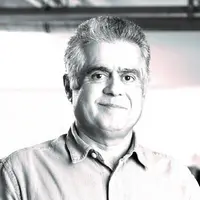BaCAI Lecture series
The BaCAI lecture series will start in the summer semester of 2024 and will then continue regularly, including in subsequent semesters, with approximately one event per month. In the lecture series, speakers from various fields of artificial intelligence will present their research.
Event details (unless otherwise stated):
- Location: WE5/00.022 (An der Weberei 5, Erba, Universität Bamberg)
- Start: 6 pm (s.t.)
- Program:
- Greeting (5-10 minutes)
- Lecture (60 minutes)
- Networking in the foyer (until 9 pm)
Dates of BaCAI lecture series in the summer semester 2024
18.04.2024 Prof. Dr. Kristian Kersting (TU Darmstadt): How to make artificial intelligence more human

The relationship between humans and machines, especially in the context of artificial intelligence (AI), is characterized by hopes, concerns and moral questions. On the one hand, advances in AI offer great hope: It promises solutions to complex problems, improved healthcare, more efficient workflows and much more. But at the same time, there are legitimate concerns about control over this technology, its potential impact on jobs and society, as well as ethical issues related to discrimination and the loss of human autonomy. The lecture will highlight and illustrate the complex tension between innovation and moral responsibility in AI research.
About Prof. Dr. Kristian Kersting
Prof. Dr. Kristian Kersting is co-director of the Hessian Center for Artificial Intelligence (hessian.AI) and heads the AI and Machine Learning department at TU Darmstadt. His research includes Deep Probabilistic Programming and Learning and Explainable AI. He is a Fellow of the Association for the Advancement of AI (AAAI), the European Association for AI (EurAI) and the European Lab for Learning and Intelligent Systems (ELLIS), book author ("Wie Maschinen lernen") and winner of the "Deutscher KI-Preis 2019". He writes a monthly AI column in the magazine "Welt".
13.6.2024 Prof. Dr. Nassir Navab (Technical University of Munich): Particularity and Challenges of Machine Learning for Intra-operative Imaging

Towards precision and Intelligence in high intensity, dynamic environments
Lecture in English
Over the past decade, the rapid advancements in machine learning (ML) have revolutionized various fields, significantly impacting our lives. In this talk, we will delve into the realm of medical applications and explore the challenges and opportunities associated with integrating these cutting-edge technologies into computer-assisted interventions. Our primary focus will be on fostering acceptance and trust in machine learning and robotic solutions within the medical domain, which often necessitates the path through Intelligence Amplification (IA). Augmented Reality (AR) allows us to leverage IA to augment human intelligence and expertise, ultimately paving the way for the seamless integration of Artificial Intelligence (AI) and robotics into clinical solutions.
Drawing from some groundbreaking research conducted at the Chair of Computer-Aided Medical Procedures at both TU Munich and Johns Hopkins Universities, I will present a series of novel techniques developed to address the unique demands of medical applications. Specifically, we will explore their practical implementations in diverse areas, including Robotic Ultrasound Imaging, Multimodal Data Analysis, and Semantic Scene Graphs for Holistic Modeling of Surgical Domain. Furthermore, I will showcase compelling examples of how AR-solutions can serve as catalysts for embracing AI in computer-assisted surgery. By harnessing the power of IA, we can unlock the full potential of AI technologies, bolstering acceptance and driving the future of computer-assisted interventions. Join me on this enlightening journey as we navigate the intricate intersection of machine learning, medical advancements, and the path from intelligence amplification to artificial intelligence in healthcare.
About Prof. Dr. Nassir Navab
Prof. Dr. Nassir Navab is a full professor and director of the Laboratories for Computer Aided Medical Procedures (CAMP) at Technical University of Munich (TUM) and an adjunct Professor at Johns Hopkins University. He is also the director of biannual Medical Augmented Reality school series at Balgrist Hospital in Zurich. He is a Member of Academia Europaea and received the prestigious MICCAI Enduring Impact Award in 2021 and IEEE ISMAR 10 Years Lasting Impact Award in 2015. In 2001, while acting as distinguished member of technical staff at Siemens Corporate Research (SCR) in Princeton, he received the prestigious Siemens Inventor of the Year Award for the body of his work in interventional imaging. He also received the SMIT Technology Innovation Award in 2010. He is also honored as Medical AR Pioneer in AWE XR hall of fame in 2024. His students have received many paper awards including 15 awards at the prestigious MICCAI events, 5 at IPCAI, 2 at IPMI and 4 at IEEE ISMAR. He is Fellow of the MICCAI Society and acted on its board of directors from 2007 to 2012 and from 2014 to 2017. He is also an IEEE Fellow and Fellow of Asia-Pacific Artificial Intelligence Association (AAIA) and one of the founders of IEEE Symposium on Mixed and Augmented Reality (ISMAR) and has been serving on its Steering Committee since 2001. He is an Area Chair for ECCV 2024. He is the author of hundreds of peer reviewed scientific papers and over 100 granted US and international patents. As of April 2024, his papers have received over 76,600 citations and enjoy an h-index of 117.
27.06.2024 Prof. Dr. Wolfram Burgard (University of Technology Nuremberg): tba

tba
11.7.2024 Prof. Dr. Milica Gašić (Heinrich-Heine-University Düsseldorf): tba

tba
![[Translate to English:] [Translate to English:]](/fileadmin/bacai/images/BaCAI_Logo_RGB.svg)